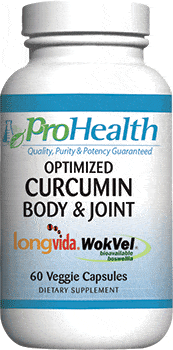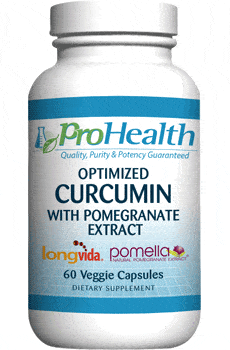2
The Golden Spice, Part 1: Nine Reasons Curcumin Supplementation Can Improve Your Health
Curcumin supplementation can help optimize your health, but more importantly can support the healing of many chronic issues, from systemic inflammation to Type 2 Diabetes and more. If you’re not currently supplementing with curcumin, find out what you’re missing.
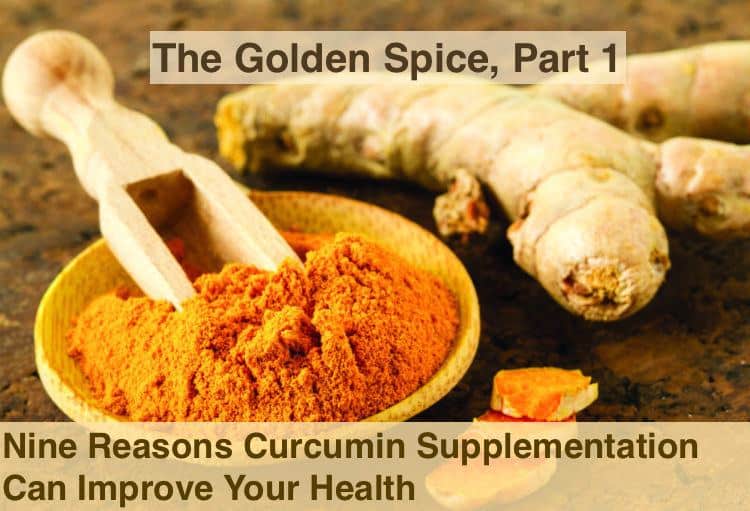
IF YOU’VE ever been to India, the first impression you experienced might have been the scent of turmeric. The smell of turmeric, the bright yellow spice used in curries, fills almost every restaurant and home in India. Indians eat turmeric because it’s been cultivated and used liberally in their cuisine for over 5,000 years, and they know it’s medicinal value. (1)
Ayurvedic and traditional Chinese medicine recognized turmeric as a healing agent for everything from flatulence to liver disease, and current research indicates that this tantalizing spice may be useful for lowering rates of breast, prostate, lung and colon cancers, and also for treating breast cancer, inflammatory bowel disease, Crohn’s disease and possibly cystic fibrosis.
The list of potential health benefits ever expands as new studies uncover additional benefits from this southeast Asia plant from the Curcuma longa family; for instance, new and especially exciting research is focused on how turmeric might prevent Alzheimer’s disease. (2)
Turmeric just might be the most valuable herb in your cabinet, one that Authority Nutrition declares “… may be the most effective nutritional supplement in existence.” (3)
Indians consume the most turmeric in the world, and incidentally, have a low incidence and prevalence of Alzheimer’s and cancer. (4, 5) Is this coincidental or causal? That’s a question you’ll have a well-informed answer to as you read on about the many preventative and curative effects of curcumin, not turmeric, per se.
It’s principally from the medicinal powers of curcumin that turmeric’s antimutagenic, anticarcinogenic, antifungal, antibacterial, antiviral, and antioxidant properties are derived. When you read about the seeming transformational healing powers of turmeric, it’s really the medicinal properties of curcumin that’s doing the work.
According to the supplement research site Examine.com, the most scientifically supported health benefits of curcumin are it’s positive antioxidant boosting effects and its ability to reduce depression, inflammation and pain. (6) But as you’ll soon see, there are many other health benefits that can be derived from curcumin supplementation.
This is the first of three articles that explore the substantial health benefits of curcumin:
- Here in Part 1, I present nine evidence-based health benefits derived from curcumin and introduce three curcumin-based supplements designed by Prohealth, a brand that has figured out how to dramatically improve curcumin’s bioavailability.
- Then in Parts 2 and 3, I’ll show you how Prohealth formulates its curcumin supplements with additional natural compounds to synergistically boost the natural healing effects of curcumin.
In this article, you’ll discover:
- Why Dr. Josh Axe is heads over heels about turmeric/curcumin;
- The potent medicinal properties of curcumin;
- The nine scientifically-backed reasons you should supplement with curcumin; and
- Why your curcumin supplement needs Longvida technology for superior absorption and bioavailability.
This is a long article, so let Dr. Josh Axe grease the sled, but remember that the real deal is the turmeric extract, curcumin, which is much more powerful than turmeric itself:
The Potent Medicinal Properties of Curcumin
 (Image from 21st Century Total Wellness)
(Image from 21st Century Total Wellness)
9 Reasons Curcumin Supplementation Can Improve Your Health
As you keep reading, remember this:
Curcumin’s key to disease reversal may be its ability to keep inflammation at bay.
#2. Curcumin Supplementation Improves Arthritis Symptoms Better Than Arthritis Drugs
Curcumin is a natural painkiller against both categories of arthritis, including osteoarthritis and 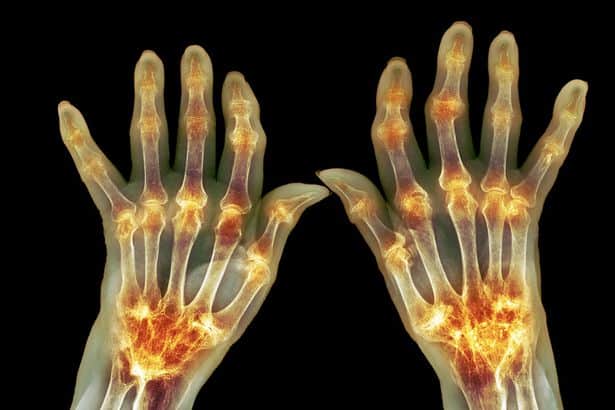 rheumatoid arthritis. Sometimes called degenerative joint disease or “wear and tear” arthritis, osteoarthritis is the most common arthritis, affecting approximately 30 million U.S. adults, and 80% of those older than 50-years-old. (16, 17)
rheumatoid arthritis. Sometimes called degenerative joint disease or “wear and tear” arthritis, osteoarthritis is the most common arthritis, affecting approximately 30 million U.S. adults, and 80% of those older than 50-years-old. (16, 17)
Because curcumin is known for its powerful anti-inflammatory and pain reducing characteristics, a study was conducted on 45 rheumatoid arthritis patients to compare the benefits of curcumin to arthritis drugs (diclofenac sodium), which have the pernicious side effects of putting people at risk of developing leaky gut and heart disease.
As reported by Phytotherapy Research in 2012, the study split these volunteers into three groups: curcumin treatment alone, the arthritis drug alone, and a combination of the two. The results of the trial were eye-opening: The curcumin group showed the highest percentage of improvement in overall, and significantly better than the patients in the group taking the arthritis drug. As important, curcumin treatment was found to be safe and did not relate with any adverse events.
The results of this study has encouraged more human research to evaluate the amazing effects that curcumin has on people suffering from various different types of arthritis. (18)
#3. Curcumin Supplementation Might Reverse Type 2 Diabetes
For lowering blood sugar and reversing insulin resistance there’s arguably no better natural treatment than 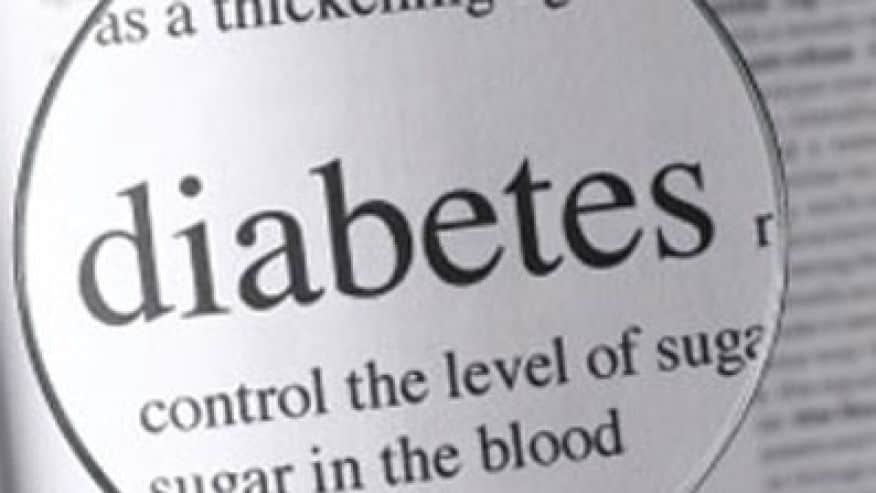 adding curcumin supplementation to your nutrition protocol (as well as berberine and alma). Curcumin supplementation can provide even better outcomes than the most popular diabetes drug, metformin.
adding curcumin supplementation to your nutrition protocol (as well as berberine and alma). Curcumin supplementation can provide even better outcomes than the most popular diabetes drug, metformin.
In 2009, Biochemistry and Biophysical Research Communications published a study out of Auburn University that explored how supplementing with curcumin can help reverse diabetes. The study discovered that curcumin is literally 400 times more potent than metformin in activating AMPK, (an enzyme that helps to reduce fat storage), which improves insulin sensitivity which can help reverse Type 2 Diabetes. (19)
In a nine-month study published in the journal Diabetes Care in 2012, researchers found that curcumin capsules delayed the onset of type 2 diabetes in 240 people with prediabetes. Nobody taking the curcumin was diagnosed with type 2 diabetes by the end of the trial! (20)
There’s a few diabetes statistics I’d like to point out:
- More than one in every 10 adults who are 20 years or older has diabetes.
- For seniors (65 years and older), more than one in four have diabetes.
- Research suggests that 1 out of 3 adults has prediabetes. (21)
That last factoid is mind boggling — one in three adults is prediabetic, and by the way, most of them have no idea that they’re at risk.
This is a good example of the value of taking certain supplements as a preventative measure. Of course, no supplement can successfully help you weather the storm of a poor diet, but curcumin supplementation in combination with a low, complex carbohydrate diet can go a long way to keeping you from daily insulin shots.
#4. Curcumin Supplementation Is Useful Against Heart Disease and Cholesterol Reduction
Heart disease is the leading cause of death in America and much of the industrialized world. High 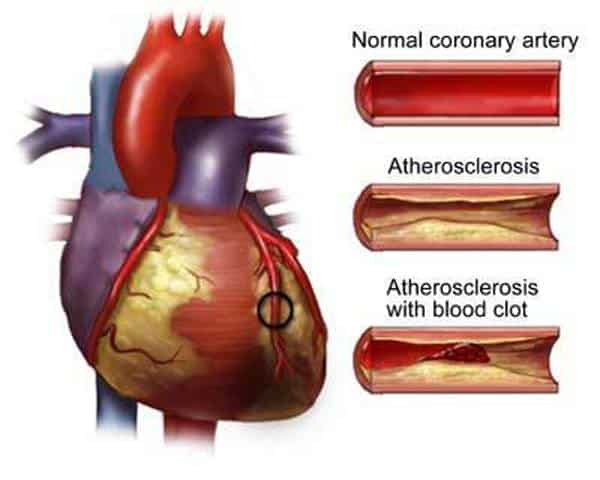 cholesterol is a precursor to the development of heart disease, so wouldn’t it be fantastic if an extract from a common spice like turmeric could help prevent heart attacks?
cholesterol is a precursor to the development of heart disease, so wouldn’t it be fantastic if an extract from a common spice like turmeric could help prevent heart attacks?
In a study published in the American Journal of Cardiology in 2012, researchers discovered that the anti-inflammatory and antioxidant properties in curcumin reduced the likelihood of a heart attack by 65% in 121 bypass patients. Three days before surgery and five days after, half the patients took curcumin capsules or a placebo. Only 13% of the patients in the curcumin group experienced a heart attack compared to 30% in the placebo group. (22)
Note: If you’re flirting with heart disease, read my two-part series on how to get a healthy heart.
#5. Curcumin Supplementation Offers Prevention Against Cognitive Decline and /Alzheimer’s Disease
Brain inflammation is thought to be a major cause of cognitive conditions like Alzheimer’s disease.  Curcumin offers brain support by improving oxygen flow and removing plaque build-up in the brain, including preventing the build-up of the protein beta-amyloid, the main component of the amyloid plaques found in the brains of Alzheimer patient. This process may slow or prevent the progression of Alzheimer’s disease.
Curcumin offers brain support by improving oxygen flow and removing plaque build-up in the brain, including preventing the build-up of the protein beta-amyloid, the main component of the amyloid plaques found in the brains of Alzheimer patient. This process may slow or prevent the progression of Alzheimer’s disease.
UCLA researchers have isolated bisdemethoxycurcumin, the active ingredient of curcuminoids like curcumin, and found that it boosted immune cells called macrophages, which are necessary to clear the plaque in the blood samples from Alzheimer’s patients. (23)
#6. Curcumin Supplementation Helps Ease Depression
According to the World Health Organization: 
- More than 300 million people of all ages suffer from depression worldwide.
- Depression is the leading cause of disability and is a major contributor to the overall global burden of disease.
- More women are affected by depression than men.
- At its worst, depression can lead to suicide.
- There are effective treatments for depression. (24)
As you’ll see in a moment, one of those “effective treatments for depression” just might be curcumin, although I would caution that not to believe that it is a “cure all”, particularly for major depression disorders.
A double-blind study published in the Journal of Clinical Psychopharmacology in August of 2015 explored how curcumin might affect the development of depression and enhance treatments. The researchers keyed in on one of the main factors that helps form new connections in the brain, a type of growth hormone called brain-derived neurotrophic factor (BDNF). Major depressive disorder is a brain condition linked to lower amounts of the BDNF hormone.
What they discovered is that curcumin increased the levels of BDNF in the brain, reversed the development of depression and enhanced the outcome of antidepressant treatment in major depressive disorder. (25)
In another study published on PubMed.gov, researchers took 60 volunteers diagnosed with major depressive disorder (MDD), such as manic depression, and split the group to determine how patients treated by curcumin fared against fluoxetine (Prozac, a depression drug) and a combination of the two, both curcumin and fluoxetine.
The result: curcumin was as effective as Prozac in managing depression.
According to the researchers:
This study provides first clinical evidence that curcumin may be used as an effective and safe therapy for treatment in patients with Mild Depression. (26)
#7. Curcumin Supplementation Reduces Annoying Gastrointestinal Digestion Symptoms
Turmeric is an excellent spice to improve digestion, especially heartburn (dyspepsia) and indigestion  symptoms. It can stimulate the gallbladder and produce bile, resulting in a reduction of gas and bloating.
symptoms. It can stimulate the gallbladder and produce bile, resulting in a reduction of gas and bloating.
But if your gastrointestinal issues are more severe than occasional discomfort, the concentrated turmeric extract curcumin is useful. Curcumin can relieve intestinal inflammation and relieve pain without harming the mucosal lining.
People with digestive and stomach complaints often become intolerant to medical interventions because the stomach flora is compromised and ingested drugs can literally tear up the mucosal lining. For instance, those with IBD (inflammatory bowel disease), corticosteroids reduce their pain symptoms, but damage the intestinal lining over time actually making the condition worse.
Supplementing with curcumin did not produce these side effects; moreover, due to its anti-inflammatory properties, curcumin actually helped heal the gut and supported the growth of good bacteria (probiotics).
According to Dr. Josh Axe, an in-depth analysis of all the studies evaluating curcumin’s ability to manage inflammatory bowel disease (IBS, Crohn’s disease, and Ulcerative Colitis) found that many patients were able to stop taking their prescribed corticosteroids because their condition improved so dramatically by taking curcumin. (27)
#8. Curcumin Supplementation Can Reduce Prednisone (Steroid) Use
Unfortunately, there are many health issues treated by corticosteroids, such as prednisone, including:
- Psoriasis
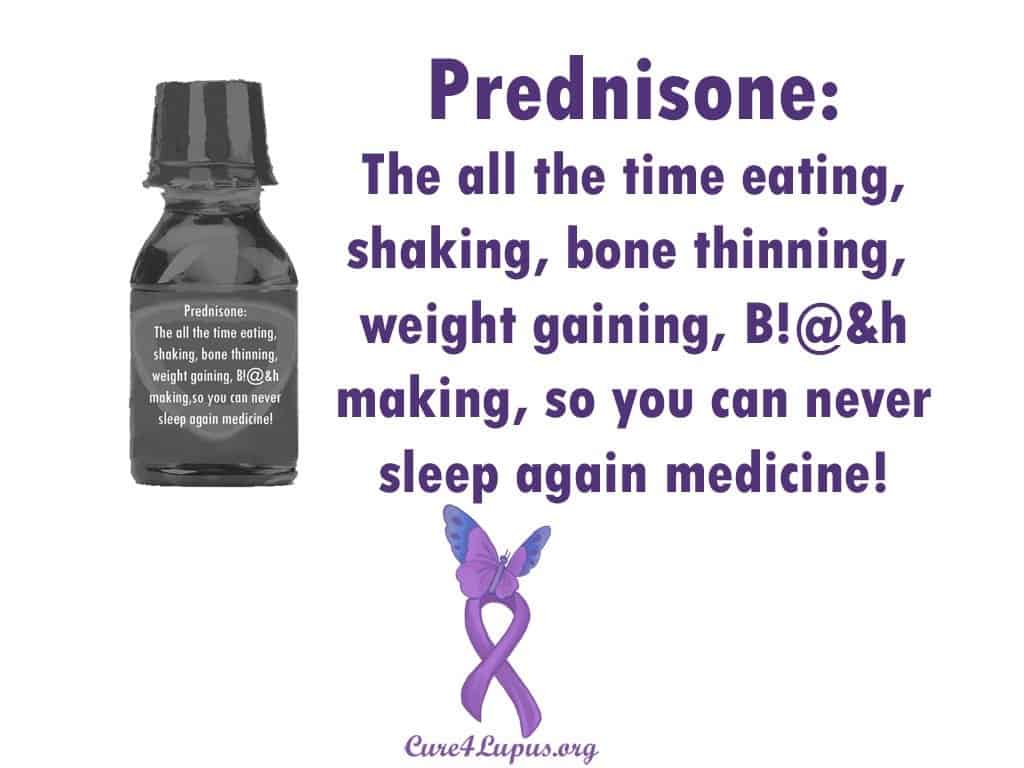
- Lupus
- Rheumatoid arthritis
- Scleroderma
- Chronic pain
Although corticosteriods can be effective at treating these conditions, it’s unfortunate that they’re used so liberally given the side effects, like the following presented by the Mayo Clinic:
- Elevated pressure in the eyes (glaucoma)
- Fluid retention, causing swelling in your lower legs
- High blood pressure
- Problems with mood, memory, behavior and other psychological effects
- Weight gain, with fat deposits in your abdomen, face and the back of your neck
Curcumin might be a healthy alternative in certain situations.
In a 1999 breakthrough clinical study, it was found that curcumin has the ability to cure chronic inflammation of the eye. Typically this condition was only treated with steroids but today it’s common for medical doctors who practice functional medicine to prescribe curcumin instead. (28)
Dr. Andrew Weil reports that turmeric — and here he’s referring to the active compound, curcumin — is a wonderful alternative to corticosteroids for Multiple Sclerosis, at least in mice:
“The researchers at Vanderbilt University Medical Center found that turmeric blocked the progression of an MS-like disease in mice. Although these findings are preliminary, the mice showed little or no sign of the symptoms of the disease after being injected three times a week with 50 and 100 microgram doses of curcumin, a compound found in turmeric. A group of mice who didn’t get the injections went on to develop severe symptoms of the disease.” (29)
If you’ve been prescribed and are using corticosteroids, do not stop them cold turkey in preference for curcumin. Instead, talk to your doctor and see if you can gradually wean yourself from steriods while supplementing with curcumin. The lack of side effects with curcumin may be its greatest advantage compared with corticosteroids, and thereby might be worth examining.
#9. Curcumin Supplementation May Improve Cancer Outcomes
Curcumin may effectively prevent and treat various types of cancer, including colon cancer, oral cancer, 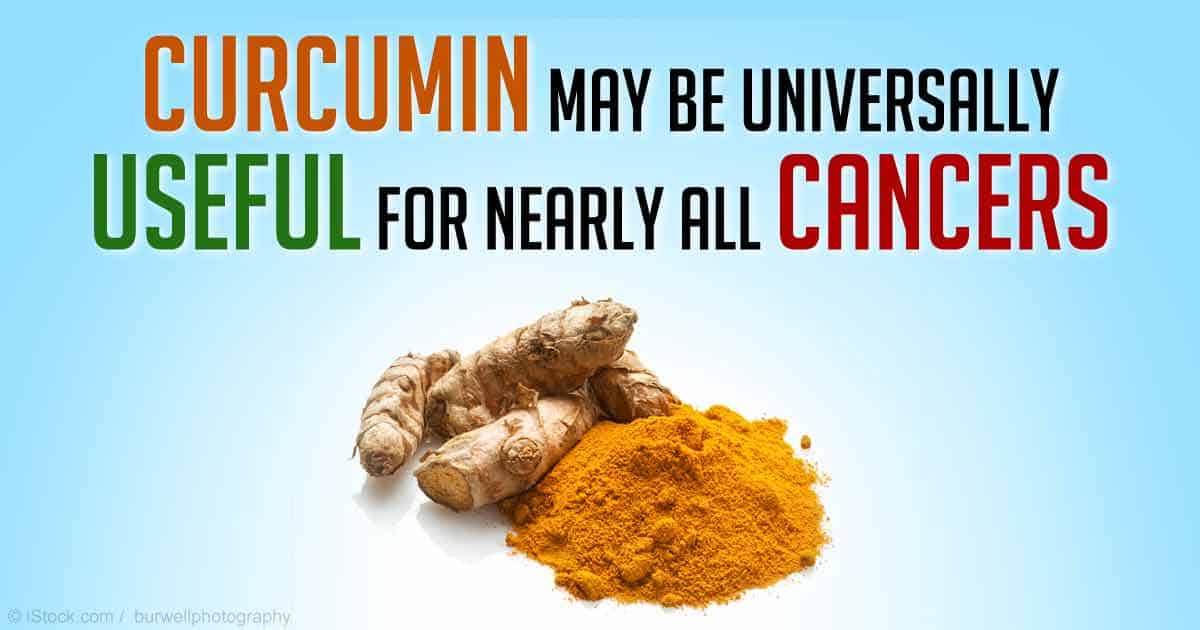 mammary cancer, esophageal cancer, pancreatic cancer, breast cancer, chronic myelogenous leukemia, pancreatic cancer, and orbital pseudotumors.
mammary cancer, esophageal cancer, pancreatic cancer, breast cancer, chronic myelogenous leukemia, pancreatic cancer, and orbital pseudotumors.
The anticancer potential of curcumin stems from its ability to suppress proliferation of a wide variety of tumor cells. In its report, Anticancer Potential of Curcumin: Preclinical and Clinical Studies, PubMed.gov says that extensive research over the last 50 years indicates curcumin can both prevent and treat cancer:
“…it is quite apparent that curcumin has tremendous potential for prevention and therapy of various cancers.” (30)
Tests have shown that curcumin can kill cancer cells in laboratory dishes, and also slow the growth of the surviving cells. Furthermore, it has been found to reduce the development of several forms of cancer in lab animals, while also shrinking various animal tumors. (31)
Another study on the role of curcumin in cancer therapy found that:
“Research over the last few decades has shown that curcumin is a potent anti-inflammatory agent with strong therapeutic potential against a variety of cancers. Curcumin has been shown to suppress transformation, proliferation and metastasis of tumors.” (32)
Cancer Research UK lists curcumin-based cancer research, and makes these assessments:
- A phase I clinical trial looked at giving curcumin to 25 patients with pre-cancerous changes in different organs. This study seemed to show that curcumin could stop the precancerous changes becoming cancer.
- A number of laboratory studies on cancer cells have shown that curcumin does have anticancer effects. It seems to be able to kill cancer cells and prevent more from growing. It has the best effects on breast cancer, bowel cancer, stomach cancer and skin cancer cells.
- A 2013 international laboratory study looked at the effects of a combined treatment with curcumin and chemotherapy on bowel cancer cells. The researchers concluded that the combined treatment might be better than chemotherapy alone.
- A 2007 American study in mice seemed to show that curcumin helped to stop the spread of breast cancer cells to other parts of the body. (33)
Bottom line: Curcumin seems to work well to help naturally treat cancer, and may especially effective at treating breast cancer, colon cancer and skin cancer. That said, if you have cancer do not abandoned whatever protocol your doctor recommends in favor of curcumin supplementation. You need to work with the medical professionals that are treating you.
Prohealth and Longevida Technology
I’m going to make an unabashed pitch for Prohealth’s curcumin supplements, and I do so for three reasons:
- I have a longstanding, 25-plus year relationship with Prohealth both as a mega user of their supplements and advisor, so I know the quality of their products first-hand.
- Their curcumin supplements are made in partnership with Longvida, a company that has patented a technology that produces curcumin optimized to deliver free curcumin into target tissues through the critical bioavailability requirements of permeability, solubility, and stability. Consequently, the curcumin you use from Prohealth gets absorbed — it’s approximately 65 times more bioavailable than regular curcumin. (34)
- Prohealth’s curcumin is an ever-present part of my supplement arsenal and — although I can’t prove it — I believe it’s part of why I never get sick and have no indications of arthritis or other chronic health issues.
In the forthcoming Part 2 of this series about “The Golden Spice”, I will go deeper into how Prohealth pairs specific compounds to their curcumin supplements to boost their effectiveness, particularly for health issues relating to cognitive health, arthritis and inflammation.
For instance, Prohealth adds Bacopa monnieri to its Curcumin, Brain and Focus, Boswellia serrata to its Curcumin, Body and Joint and Pomegranate extract to its Curcumin with Pomegranate Extract. Each of these compounds have been selected to enhance specific health benefits provided by curcumin:
- Bacopa monnieri is a nootropic herb that has been used in traditional medicine for longevity and cognitive enhancement. Rather than use any run-of-the-mill Bacopa monnieri in its Brain and Focus formulation, Prohealth chose the proprietary extract Bacognize®, standardized to 45% bacoside concentration. This ensures that a consistent and potent dose of Bacognize is delivered to the body activating 5HT (serotonin) receptors.
- Boswellia serrata is a plant that produces Indian frankincense, and is known to lower inflammation, support immune function and potentially and may even help fight cancer. (35) Here again, rather than use a common form of Boswellia to add to its Body and Joint formulation, Prohealth blends in the proprietary WokVel® Extract derived from Boswellia serrata to boswellic acids to achieve efficacious levels of keto-boswellic acid. It’s an all natural, clinically backed botanical ingredient known to support joint health, which is amplified in this capacity when mixed with Prohealth’s Longvida curcumin.
- To enhance the capacity of its curcumin to support cognitive health, Prohealth adds Pomella® Pomegranate Extract to its Pomegranate Extract, which is a standardized breakthrough formula of the primary natural antioxidants of the pomegranate fruit, punicalagins. It is 100% natural, clinically researched and highly bioavailable*. Note: Urolithins (Pomella’s gut-derived metabolites) have recently captured the attention of researchers for their incredible potential to protect brain cells responsible for memory. (36)
I’ll go into more detail about these compounds and how they act synergistically with curcumin to support brain function, inflammation and joint pain in Parts 2 and 3, but in the meantime, check them out:
(Click images for more info.)
Your Takeaway
The list of turmeric health benefits is seemingly endless. What you want to know is how it can help you optimize the health you have, or help improve the ills you wrestle.
Hopefully, you at least scanned the “9 reasons curcumin supplementation can improve your health” and focused in on your health issue(s), read the science and are willing to try curcumin.
Remember that the underlying cause of most chronic ills is chronic inflammation, and curcumin’s capacity to assist in dampening that fire is the key to much of its effectiveness relative to the other health issues it can help overcome.
Click here to read Part 2
Last Updated on September 29, 2022 by Joe Garma
Share. Someone you know will be thankful.












